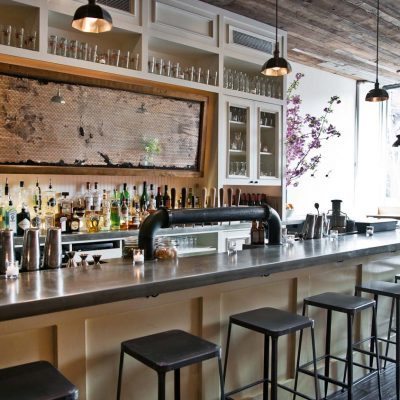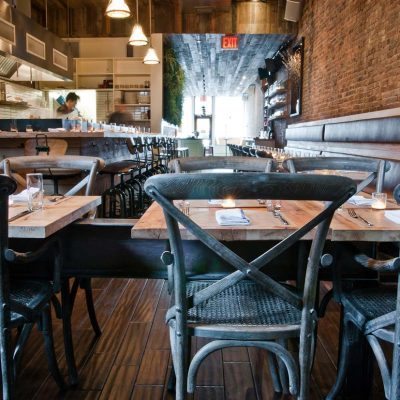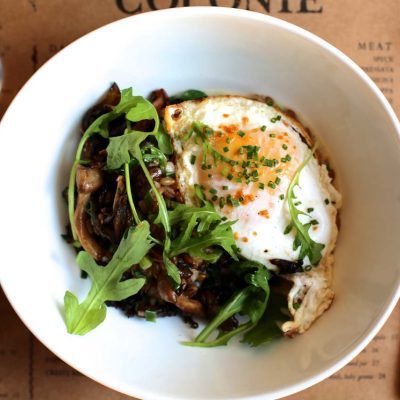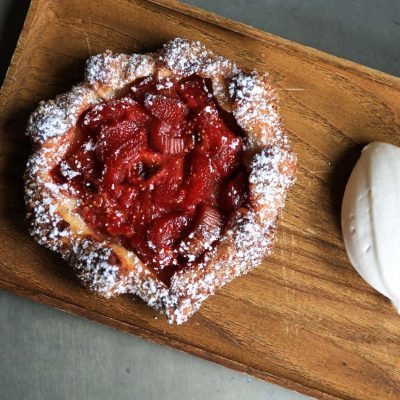Brooklyn Heights’ Colonie serves sustainability, with a side of delicious
by Meredith Napolitano Stettner
“Grandma food” is a term thrown around the circles of frugal gourmands, implying reimagining old recipes in new ways, simple food with soul, and adopting the ways our grandparents thought about preparation. And a wave of chefs is heralding the ideology…that what we have is precious, that we ought not waste it, and that perhaps in sustaining it, we can multiply it: a thought mostly associated with grandmas, who turned every last heel of bread into breadcrumbs.
Colonie, a chic, rustic outpost on Atlantic Avenue, just a few blocks from the East River, is such a point where old meets new. Its carefully-curated, seasonal American fare is locally sourced, and behind the kitchen door (or lack thereof—the kitchen is actually open) is a system sustained on a body of real principles.
“He who dies with the biggest pantry wins,” according to Sean Brock’s manifesto and foodie-crush cookbook, Heritage (Artisan, 2014), a notion that Colonie’s Chef, Andrew Whitcomb, 29, takes to heart. Whitcomb’s reliance on farmers and his reduction of 95% of Colonie’s waste won him a 2015 StarChefs Rising Star Sustainability Award. Indeed, heritage, and a kitchen’s future, are on the mind of the chef as much as a perfect steak sear.
“I have a responsibility to provide for the neighborhood,” Whitcomb explained.
Beginning at Colonie as a line cook alongside then-chef Brad McDonald, he was challenged to think, not just produce. “Brad encouraged me to answer questions with a question,” Whitcomb recalled. “To ask why we do something, to be figuring it out all the time.” As McDonald moved on, Whitcomb became chef, and now manages a kitchen of nine staffers.
A Cobble Hill resident who grew up in Maine and who attended the Culinary Institute of America, Whitcomb was influenced by his grandparents, who cooked from scratch and gardened. His grandmother grew vegetables and made bread… his grandfather made root beer and soda.
“We are product first, technique second here,” said the chef, who sources much of Colonie’s produce from Sparrow Arc Farm in Copake, NY, and uses as many local purveyors for cheese and bread as possible. “I care less about every single thing being organic than supporting a good farm,” adding that a farm with high standards is often just priced out of being certified organic. “I don’t want to see farms close. I’ll say, ‘Send me all your corn if you need to get rid of something.’”
“What can we make? If we can make it, we should.” Whitcomb said of the challenge to not waste a thing. “And it does become a game.” An addictive one, too. Inspired by frugality and preservation practices pre-1900, he believes fermenting is as much about keeping things for the next season as adding depth. Canned tomatoes, sitting in juices, for example, will develop flavor.
Colonie recycles and renews by making vinegar from old wine and beer, pickling ingredients, and drying and preserving the “zillions” of citrus zest strands collecting behind the bar. Underripe strawberries steep in vinegar, horseradish and ketchup are house-made, and spent coffee grounds infuse desserts.
On the menu, meat and fish take up space, but not focus. With only a few meats, it may be harder to choose a vegetable. Seasonal crops (carrots, beets, little gem lettuce) now won’t be tossed together as salad, but distinguished on a plate of their own.
“I like to maximize respect for the animal with portion sizes,” Whitcomb said. “When I can, I use meat and fish to flavor… and maybe sometimes you don’t want to eat a whole steak.”
This makes things more affordable for customers and the kitchen, as both can buy less and stretch more. A butcher’s cut steak ($32) is the most expensive item, while Sulllivan County brook trout ($27), a pork chop ($28), burger ($18), and P.E.I. mussels ($14) round out the menu. For brunch, instead of smoked salmon, cured steelhead trout (equally meaty but less over-fished) is served. Hand-made pasta is another avenue to utilize seemingly monotonous ingredients just hanging around, like peas.
“No one may want to eat a bowl of them,” the chef said, so he blends them into dough.
Table-side, Whitcomb and staff are careful to avoid unsolicited, Portlandiaesque explanations of where ingredients are sourced, or preaching low-waste kitchen practices, but they will gladly offer them if asked.
The tide is changing broadly away from wasteful habits, Whitcomb thinks. “Restaurants are often not at all concerned with throwing away,” but to remain affordable as a small business, low-waste is key, he explained.
While bottling vinegar, Worcestershire sauce, and other pantry staples, this low waste cycle is one that keeps on giving, but some common throwaways prove more vexing. Tough, ugly, outer leaves of cabbage and lettuce, for example—common trash in commercial kitchens—are mostly fermented or redirected into less obvious presentations here.
Finding a place for every top and scrap can feel like trying to save the world though—the vegetable world, that is. Currently, Whitcomb’s problem is tops. “Beet tops, carrot tops, ramp tops…we’ve also now stopped peeling carrots,” he said. Instead, they scrub and dip in a brine to remove dirt.
Inevitably, ancestral inspiration influences tools, too. “Machines take out guesswork, but also soulfulness,” observed Whitcomb, which is why he doesn’t have a sous-vide set up, and why meat and fish go on the grill and cast iron. “I feel we should be able to cook from scratch. Listening and looking to know when something is cooked. I’d rather take extra time to show someone to use their senses.”
In April, Colonie participated in Kids Table, a children only tasting, encouraging them to participate in shaping the food systems of tomorrow while enjoying a meal. Along with some of NYC’s top restaurants, it partnered with The Melting Pot and No Kid Hungry for the project.
“Kids are still moldable. If we can change the way they perceive food, we can change the future,” the chef observed.
Perhaps that’s just what our grandparents intended all along. If the core of sustainability is teaching people how to take care of themselves going forward, then cooks and restaurant goers alike may have much more to learn from a head of cabbage than they thought.
Colonie
127 Atlantic Avenue / 718.855.7500 / colonienyc.com











